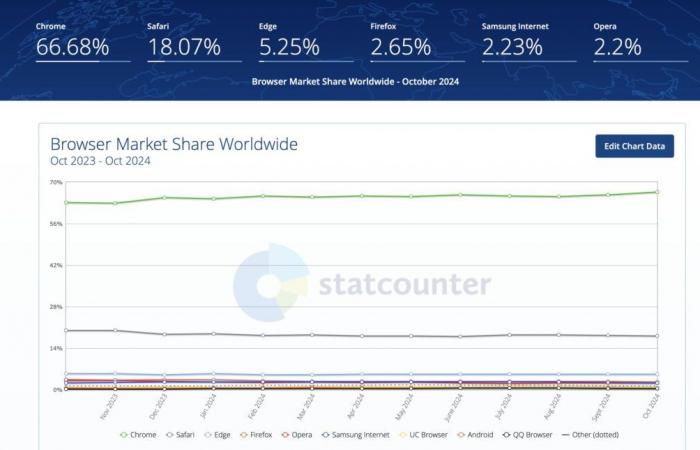The United States Department of Justice (DOJ) wants to dismantle Google, which it accuses of abuse of dominant position. One of his proposals is the sale of Chrome, to prevent Google from having a monopoly on web browsing, search and advertising.
With 67% market share, Google Chrome clearly crushes its competitors. Only Safari, with 18% market share (notably thanks to the iPhone), is holding up. Other web browsers don't weigh much, which gives Google a great position of strength on the Internet.
The superpower Google could soon be arrested by the DOJ, the United States Department of Justice. The company, which is accused of anti-competitive and monopolistic practices, could soon be forced to sell some of its operations in an effort to dismantle it. On November 18, the DOJ asked judges to force Google to sell Chrome, to make it lose control of the web.
The future owner of Chrome will have a monopoly on the web
By forcing Google to sell Chrome, the DOJ hopes to break what it describes as a monopoly.
According to the justice department, Google uses Chrome and its search engine to reign in the online advertising market, while imposing its own services in its browser (and on Android). His proposal must still be accepted by the federal judge, but is in any case indicative of the fact that the DOJ intends to strike hard. Donald Trump, before his election, had warned that he also intended to attack Google, while wanting to protect it from an explosion that would favor its foreign competitors.
For the DOJ, Google uses Chrome to monitor the activities of its users, in order to better target them. The integration of products like Gemini or Lens is also frowned upon by the United States, which believes that Google is abusing its dominant position to strengthen its ecosystem.
Technically speaking, the DOJ may be correct in finding that Google is using Chrome to promote its other services. However, he seems to ignore an important fact: Google Chrome does not need Google Search, Google Lens, Google Ads or Google Gemini to be a dominant player.
You just have to look at the numbers to see it: Chrome is the most used browser on the planet. Whoever buys it, whether it is a giant or a start-up, will automatically benefit from the same “monopoly”. Google will undoubtedly be weakened, but the problem will be shifted elsewhere, with the risk of creating a new Google. And the risk of seeing Google launch a new browser, unless the DOJ prohibits it.
Another point not mentioned by the DOJ: Google Chrome is not the only way to access Google Search. Competitors Safari and Firefox, to name but a few, also offer the Google search engine by default (thanks to lucrative contracts). Thinking that taking Chrome from Google will slow down the use of the search engine is false (unless the person who buys Chrome has its own search engine, but the potential candidates are few).


Another element forgotten by the courts: Chromium, which Google develops as open source. The open source browser, which serves as the basis for competitors like Edge, could be abandoned by Google if it no longer has the right to develop Chrome.
Google risks historic dismantling
Another proposal from the DOJ: the separation of Android and the Google Play Store, to prevent Google from offering its own application store on smartphones competing with the iPhone. This is once again absurd, since Android has always been an open ecosystem, with the possibility of installing applications from the web. This proposal is reminiscent of the European injunction against Apple, which will force Apple to let its users uninstall the iOS App Store. The approach is interesting, but in practice there is a lack of understanding of how a smartphone works.
Today, the fate of Chrome and the Play Store is not sealed. Google accuses the DOJ of maintaining a « agenda radical » and can still hope that the judge goes less far. The legal process could take several months and, in any case, wait until President-elect Donald Trump returns to the White House. Unlike Kamala Harris, who was pro-justice and pro-dismantlement, the Republican is much more ambiguous. He could intervene to spare Google. Apple, which is also the subject of a complaint, could be the next target.








